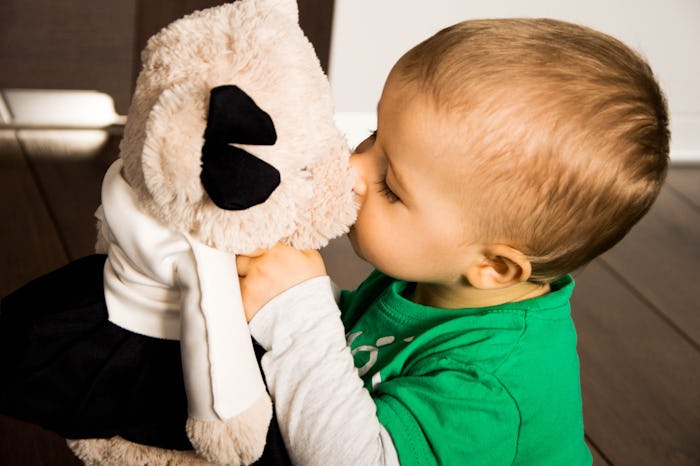Healthy and kind. When I think about what I want for my 2-year-old daughter, those are things that top the list. Broccoli, regular trips to the park, and teaching her the importance of the occasional slice of cake can help me nail down the healthy part. But what about the whole not-being-a-jerk part? What can I do to make sure my baby is kind?
"Consistency is key — as in all things parenting — with encouraging kindness,” says Amy Webb, who runs The Thoughtful Parent and holds a Ph.D. in Human Development and Family Sciences. "Consistency with our words as well as our actions."
The mom of two says it’s also helpful for parents to understand that children have "an innate tendency towards kindness" and that it starts at a young age.
"Even infants show distress when they hear another child cry, which is the first sign of empathy," Webb says. "Our role as parents is to encourage this innate tendency and not let it disappear as they reach elementary age."
Webb points to a recent Harvard University study in which researchers discovered a large gap between the values of kindness that parents believe they are modeling for kids and what kids are actually hearing and seeing. "Almost all parents say they want to raise kind kids, but in reality, they value success, academics, or happiness more than kindness," she says. Webb claims ways to be more of a model for kindness include interactions with your partner or the grocery store clerk.
Obviously no child — or parent for that matter — is without fault, so what about when one of you can’t keep your wits about you?
"Learn how to apologize," says Shanna Donhauser, a child and family therapist in Seattle, Washington, in an email interview with Romper. Instead of issuing or demanding a hurried "I’m sorry," Donhauser recommends parents draw attention to the way the affected person's face and body looks.
"Talk about or ask them about their hurt feelings," she says. "And help your child understand how he or she can make things better with their words and actions."
Dr. Mayra Mendez, a licensed psychotherapist and program coordinator for intellectual and developmental disabilities and mental health services at Providence Saint John's Child and Family Development Center in Santa Monica, California, tells Romper the best way to do this and help kids turn things around is to "set clear, reasonable, and developmentally appropriate ground rules and boundaries."
"Use clear, calm instructions and check for understanding to ensure that the child and the parent have a shared understanding of limits and expectations of behavior," she says. "Consistency and follow through is critical in effective parenting and remembering that discipline should be about educating the child about what to do rather than what not to do."
This includes acknowledging positive behaviors that a child demonstrates, Mendez says, adding that the phrase "catch them being good" is a powerful way to help reverse the pattern of negative discipline practices and replacing them with positive acknowledgements and validations.
Webb says parents should also check in at school to see how the environment incorporates values of kindness as part of a regular routine.
Of course, if you've validated and modeled your heart out and it still isn't working, then you can always try ignoring them, too. I hear it works wonders for bad behavior — and your sanity.
